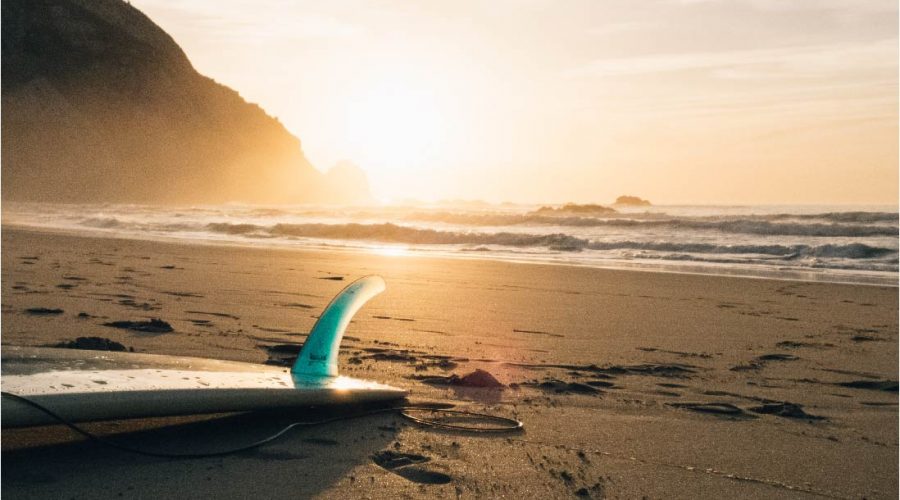What I Learned Podcasting for a Year
How it all began
My first season of The Oceanriders Podcast has finally come to an end. As I was wrapping up this amazing and exhilarating year of podcasting, I thought it could be interesting to share what I learned this past year.
To put things into perspective, I am a huge podcast and radio fan. The radio has been my companion for the past 30 years. I wake up and listen to the radio, I used to study listening to the radio, I walk the dog listening to the radio, I work listening to the radio and even fall asleep listening to the radio. I started listening to podcasts when I got my first iPod. Most of the time, it would be to listen to re-runs of my favorite radio station here in France : France Inter, or specific marketing podcasts for my online business (Shopify Entrepreneurs, Tim Ferriss…). But about 3 years ago I discovered the Rich Roll Podcast, and I absolutely fell in love with his interviewing skills, the format and the types of guests he has. Rich Roll’s personal history with podcasting changed the paradigm for me : you didn’t have to be a professional journalist or media professional to be a brilliant podcaster!
Fast forward a couple of years where I met a wonderful copywriter on a permaculture farm in Italy : Fiona Barrows. I was so stoked when she announced that she was launching a podcast called There Are Other Ways. She has been doing a wonderful job and I loved listening to a podcast by somebody I had actually met in real life. It inspired me so much, I thought to myself : why not give it a go too?
Getting Started
I then went into « commando » mode and found out as much info as possible on podcasting, what the « market » is all about, why it’s important to find a niche, what tools to use and eventually how to put a podcast together. So I decided to try it out.
The big leap
A few months and online courses later, I was finally ready to take a big leap into the unknown and to start interviewing people… It first began with investing in a $49.90 USB microphone (which sounds awfully tinny if you listen to the first episodes), choosing a subject/niche (which for me and my story, obviously had to be related to surfing) and recording a trailer. With absolutely no knowledge in sound engineering, I made my first attempts. I made my own jingle on GarageBand and did the logo by myself (which was the fun part for me). The time and energy required to record a 20 second trailer was so scary, I remember trembling behind the mic!
Finding my audience
The second step was to get some listeners! There wasn’t much point in putting in the huge amount of work for nobody to download the episodes… so I also opened an Instagram account. I started to build-up a following on Instagram to gain some traction once the first episodes would be ready. To my surprise, Instagram revealed itself as a great place for recruiting guests too! I mostly did cold DMs but I got fabulous feedback.
The rest is history and you can find the episodes here or subscribe to my podcast on iTunes or Spotify
Reflecting on these past 12 months, here’s what I learnt along the way:
1/ First, you have to start
It sounds obvious doesn’t it? But it isn’t. My guest James Victore wrote a whole chapter in his book « Feck Perfuction » and talks about it in episode 20.
My first task was to reach out to people I knew (or didn’t know) and convince them to spend an hour on Skype chatting about their surf/work lifestyles. It’s a surprisingly daunting experience, especially when you’re not confident with what to say, you’ve never done it before, or even worse, if you haven’t got much info on the guest. Add the constant background noise of a construction site next door, a crappy internet connection and I had the ultimate recipe for a white knuckle experience. There are some undisclosed episodes that are so bad : sincere apologies to my guests for wasting their time. I also had a go at recording in French which was much more comfortable for me to do, but I didn’t want to confuse my listeners with a one off French episode every now ad then. I sincerely apologise to my French guests for not (yet) getting their episodes out.
But the most daunting experience was actually launching the podcast. I started interviewing in June and had planned to get it going for the Quik Pro in October. As the days were getting closer to the launch date, I was backpedaling finding all sorts of excuses not to get these episodes out. I was seriously procrastinating. The editing seemed impossible. I think I had to redo my first episode twice or three times. Plus I had this horrible self talk in my mind : What if I get made fun of? What if my friends think it’s awful? What if my voice sounds stupid, what if, what if?
I’m so glad I started though. This is one of the most amazing and empowering things I have been able to do..
2/ Language
I left England and moved to France when I was 11. Ever since, I’ve been immersed in French culture. French is my « mother tongue » now : I rarely even speak to my kids in English. Long story short, my proficiency in English is of an 11 year-old with a bit of Netflix and a 5 year job in a tech company bundled into the mix. What I found difficult was to engage in conversations in English without sounding like Donald Trump. In fact one of my sisters pointed out on the first episode that I said the word « great »…a lot. Mea culpa maxima guys! As a result, I made these posters and stuck them to my screen during the interviews to find help me out!
Ever since, I’ve been working hard looking up all the words I don’t know and trying to get my vocabulary up to par with apps, books and all sorts. I hope it’s starting to show…
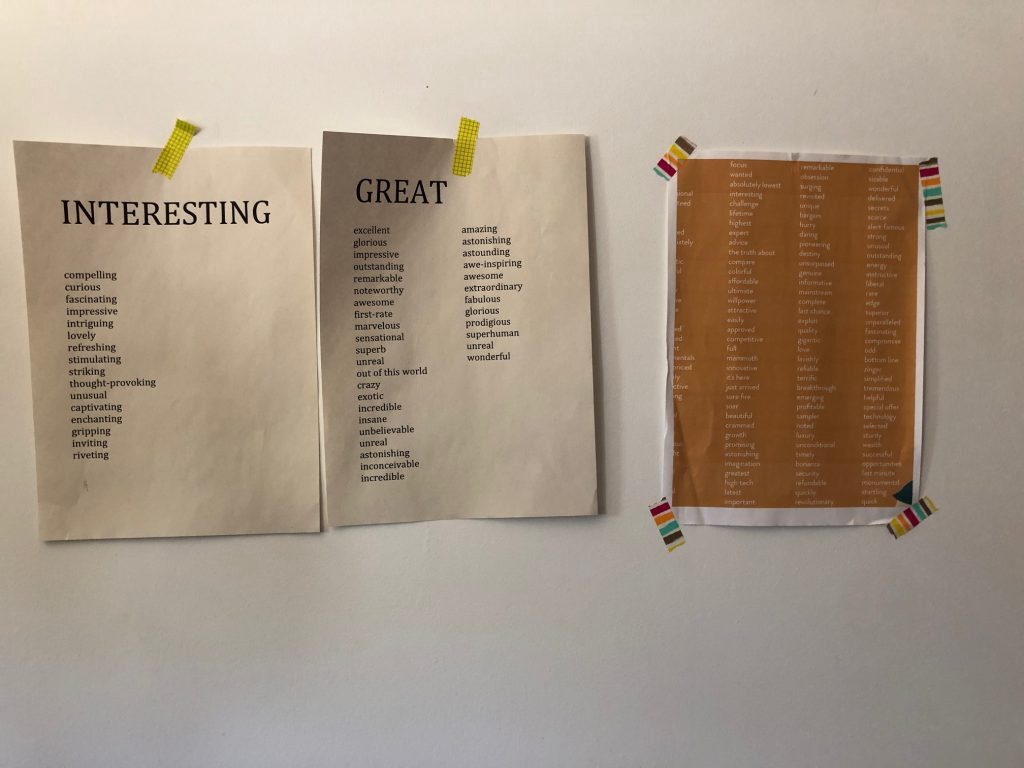
3/ Making it Sound OK
One of the secrets to proper podcasts is that they have to sound amazing. It’s not necessarily easy when you have a skype conversation and the person on the other end is ill equipped. But I had to make my side of the mic sound as good as possible. Before I started, I thought that to have a great sounding podcast, you needed a studio like this:
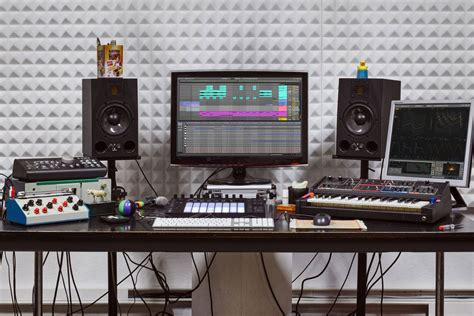
My « studio » ended up looking like this 😂:
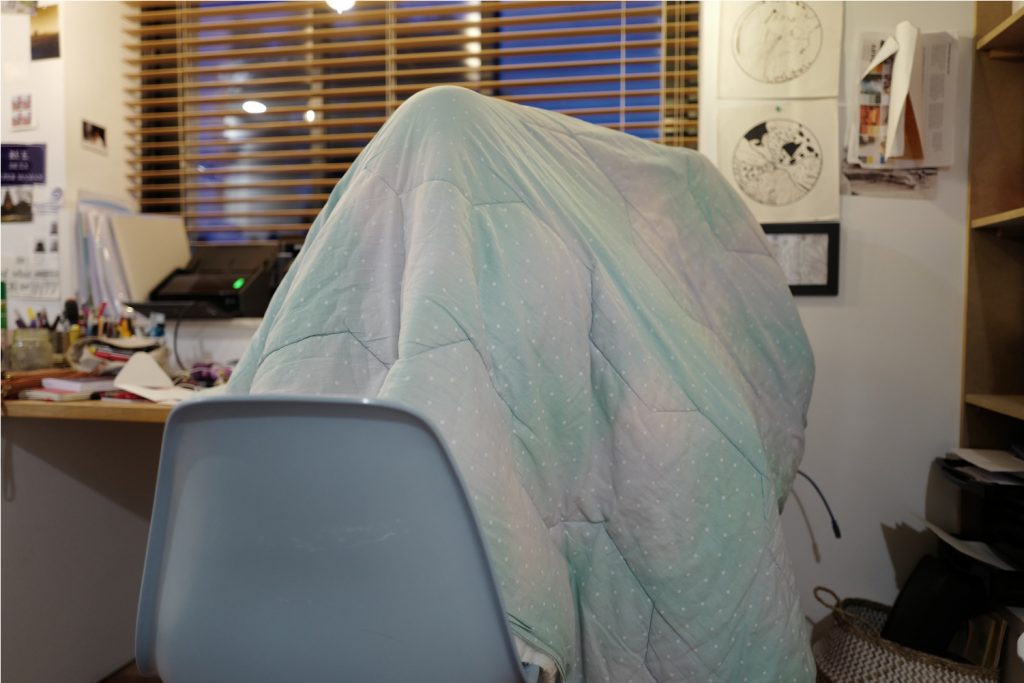
After the first few months I worked out I was using the wrong type of Mic. It picked up all the sounds (from my family washing the dishes in the kitchen above to my next door neighbor mowing his lawn). It was hopeless. I asked for an ATR2100 with a boom as a Xmas pressie (budget : about $120). From then on, there was no looking back : no need for egg boxes, carpets, cushions, duvets on my head (it used to get really hot), towels everywhere… I finally had the tools for a velvety voice!
My setup now looks like this: pretty streamlined isn’t it?
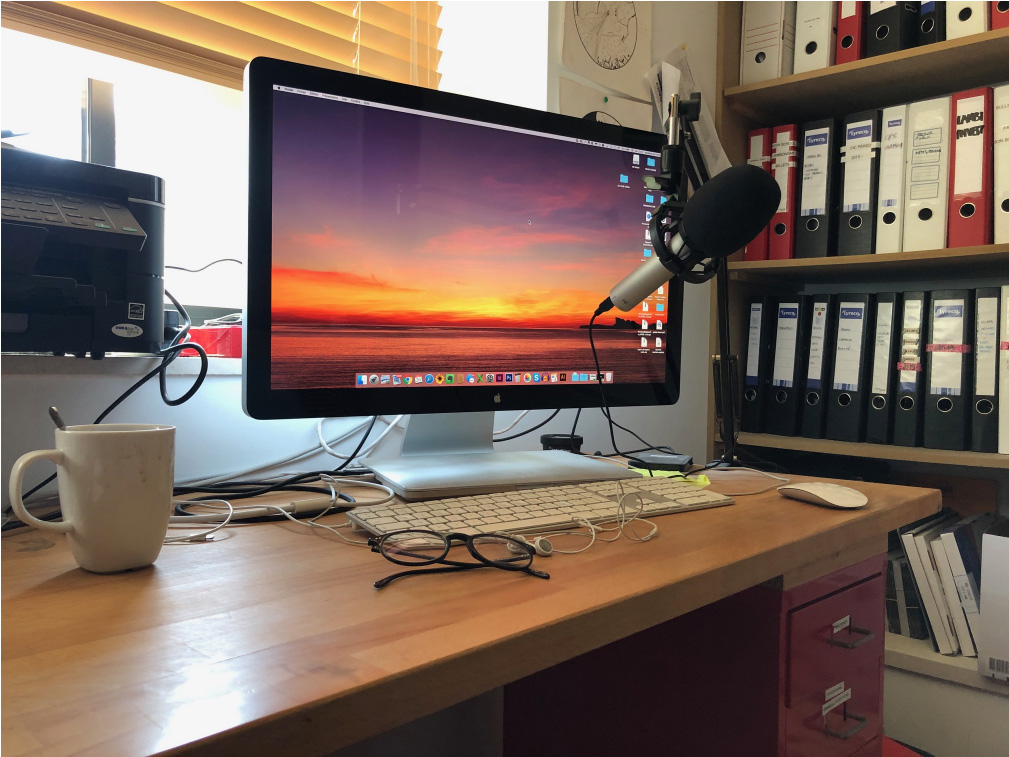
4/ Finding my voice
One of the most difficult processes of this podcast was to « find » my voice.
I’ve always had trouble listening to the sound of my own voice. In fact, when I speak in English or get excited, my voice goes up an octave and I just hate it… I even went to see a drama teacher to see what I could do to improve it. Ultimately it made me figure out that I had to learn to like it : it’s what distinguishes me from others, it’s mine, and nobody can take that away from me.
I can’t say I love my voice just yet, but this exercise of pumping out podcasts has certainly helped me accept it. I am also tempted to say that the podcast has also helped me find my « inner » voice too. The Oceanriders Podcast has certainly made me reflect on the values I would like to portray in the podcast via the guests I invite, the questions I ask and the way I want the conversations to go. So listening to my guests is partly listening to what I feel too…
5/ Accepting to ask for help
I am a control freak in many areas and find it very hard to delegate. I have this stupid saying in my head « if you want something done properly, you have to do it yourself » but this principle drove me to point where I podfaded. It happened twice this year. Podfading is a bit like burnout for podcasters. I must admit, I almost gave up at one point. But I didn’t. It lead me to accept to look for help. Instead of doing it all single handedly, I decided to recruit a sound engineer and posted on Instagram that I needed help. Up popped my sound engineer offering help and she’s amazing!
From the other side of the world, she has relieved me from the stress and turmoil of making a podcast sound nice, spending hours on snipping and editing audio files and transcribing notes from the episodes. That doesn’t say it’s taken all the work away, but it’s left me doing the things I enjoy most : finding new guests, having conversations and picking out the best moments.
This leads me to
6/ The fun part is doing the interview!
If you haven’t studied media, journalism or sound engineering, podcasting is HARD! It takes time.
A lot of time.
To make a 45 minute episode, it takes at least 8 hours of real uninterrupted concentration per week. If you dilute that down with faffing around on social media and all sorts, it can amount to 2 days a week.
First you need to book guests, do your homework on them (and maybe read a book or 2), set up a plan of questions, create a comfortable atmosphere for the conversation, listen to your guests (like, REALLY listen to them) and ask smart questions, listen to the recording once it’s over to pick out the best and the worst moments, put together an intro and an outro (and then record it), write an article on Medium.com about the episode, edit the episode (or have that part outsourced), listen to it once more for quality control, post it onto the podcasting platform, and then promote it on social media…😅 it’s sometimes super difficult and very time consuming, especially when you have a day job and a family waiting for you. I sometimes wondered what I was putting my family and myself through, until someone sent me a thank you note, or shared the fact that they were listening to an episode, or a guest I absolutely adore accepted to have a chat. That’s when all the hard work IS worthwhile and my heart sings. So if you want to know how to make me feel great, just send me a friendly review, email or a DM to keep me stoked!
7/ Montetizing... eek!
I haven’t got my head around this just yet. In fact, this is more of a question my dad would ask haha! Quite frankly I still don’t know. All I know is that production costs run up to 400$/month : 12$ a month for the podcast hosting and distribution, and $365 per month for my sound engineer plus the time it takes for me to put it all together. In terms of monetization, there are loads of solutions : getting a sponsorship deal, receiving donations (Patreon etc), selling t-shirts, mugs and stickers…
I have created a “buy me a coffee” account which is a really cool system where you can donate the equivalent of the price of a coffee, no strings attached. So if you would like to contribute to my work, you can, just buy me a coffee here. Also, as the donations go to my company, K-Freelance, 1% of the proceeds will be dontated to Surfrider Europe.
It is fair to say it also means “owning it” and believing in my value which I still have a hard time doing. So I guess you could say this is a work in progress right now. In that respect, I sincerely want to thank the thousands of listeners for tuning in and for my guests who share the podcast with their followers and who contribute to enlarging my audience.
Next season I’ll be accepting any help I can get to improve this podcast, so please send any suggestions or if you fancy an internship, send offers to hello@theoceanriderspodcast.com
8/ Giving me the confidence to become a better surfer
A lot of these episodes in the past year have enabled me to meet the most amazing humans. I’ve read a ton of books (by, about, or referred to by surfers) and some of the episodes have been real heart to heart conversations. I’ve met surfing legends and my creative idols, businessmen and women who are changing things globally. It’s been such a blessing to meet my guests and have been able to talk to them. But this time spent with other fellow surfers has also encouraged me to get better at my own surfing. The fear I felt when I hit « publish » on my first episode was a bit like the terror I feel when a massive wave is crashing down on me. But I made it through and I’m so happy I did.
So, if you ask me what I learned podcasting for a year? I learnt to grow, to accept myself and to enjoy the ride. And it’s been unbelievable!
I’ll be back next week with some new episodes of The Oceanriders Podcast.
Stay tuned!
In the meantime, take care, have fun and enjoy the waves!
Ciao
Imi
SUPPORT THE SHOW
Enjoy listening to my podcast? Consider making a donation!
Donations will be used to pay for equipment, podcast editor and promotion of the podcast on social networks. The Oceanriders Podcast is a member of One Percent for The Planet, 1% of your proceeds will be donated to Surfrider Europe.

